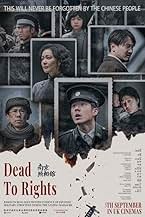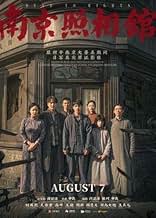Ajouter une intrigue dans votre langueDuring the 1937 Nanjing Massacre, postman A Chang posed as a photo developer, helping Japanese forces while secretly sheltering Chinese refugees. He later risked his life evacuating them and... Tout lireDuring the 1937 Nanjing Massacre, postman A Chang posed as a photo developer, helping Japanese forces while secretly sheltering Chinese refugees. He later risked his life evacuating them and revealing evidence of the atrocities.During the 1937 Nanjing Massacre, postman A Chang posed as a photo developer, helping Japanese forces while secretly sheltering Chinese refugees. He later risked his life evacuating them and revealing evidence of the atrocities.
- Prix
- 3 victoires et 5 nominations au total
Avis en vedette
10WayS-9
This film, the second big-screen work by young genius director Shen Ao, yet it showcases rare talent. Its restraint in depicting brutal history, masterful use of cinematic language, skillful orchestration of audience emotions, and its unwavering focus on the perspective of ordinary citizens-victims of the war-all lead me to believe it can rival, or even surpass, classics like Schindler's List, solidifying its place as another landmark in WWII cinema.
This film, under the influence of militarism and fascism, shows how anyone-whether Japanese soldiers from poor backgrounds or young people from noble families-can be reduced to beasts. They no longer regard other humans as their own kind, thus massacring and insulting others without any qualms. I hope everyone will have the chance to watch this film in theaters, not merely because of the historical grievances between the Japanese and Chinese peoples. But because each of us, after seeing it, should reflect on a question: On the 80th anniversary of the victory in the Anti-Fascist War, has the world truly ended its war against fascism and militarism? In today's world of 2025, have such massacres and acts of extermination finally vanished?
This film, under the influence of militarism and fascism, shows how anyone-whether Japanese soldiers from poor backgrounds or young people from noble families-can be reduced to beasts. They no longer regard other humans as their own kind, thus massacring and insulting others without any qualms. I hope everyone will have the chance to watch this film in theaters, not merely because of the historical grievances between the Japanese and Chinese peoples. But because each of us, after seeing it, should reflect on a question: On the 80th anniversary of the victory in the Anti-Fascist War, has the world truly ended its war against fascism and militarism? In today's world of 2025, have such massacres and acts of extermination finally vanished?
This film must be seen in theaters. The world needs to know what Japan did the past . The atrocities they committed in China were mirrored in Malaysia, where they similarly tortured and slaughtered our people. Let us cherish the prosperity and happiness of our nation today, and never forget the lessons of history. We must never forget the lessons of history.
First of all, never heard of these events before. The movie blasted that ignorance with incredible cinematography, powerful imagery and realism, and natural acting by the cast. Yes, its in Mandarin language and have to read subtitles, yet the movie draws you in, and is extremely immersive. Its also brutal to reflect the harsh realities, so be prepared. Its definitely a must watch in theatre - the color grading, lighting and sets are just beautiful. This movie exposes human harshness like Schindler's list did. The English title of this film is odd.
The director showed great restraint in portraying the atrocities committed by the Japanese during their invasion of China. Instead of going the easier route of focusing on amplifying feelings, the director chose to stay focused on storytelling to reenact a glimpse of the Nanjing Massacre accurately as much as possible.
If one could only watch one movie in theaters this summer(maybe even this year), Dead to Rights would be my choice.
If one could only watch one movie in theaters this summer(maybe even this year), Dead to Rights would be my choice.
This is not a movie to be enjoyed. Throughout my watch, I feel my intestines knotted from the blatant display of innumerable brutalities during the Rape of Nanking that were unfathomable strategically and ethically. Not a single body of water in the film isn't red, all bloodied by the 300,000 "swines" that were humans. Laudably, unlike some Sino-Japanese War movies that are purely slogan-calling and hostility-instigating, Dead to Rights has a rather impartial and documentary narrative stance, moving the audience by painstakingly replicating the massacre and letting the plot do the talking. While it's typical in this genre of films to vilify the invaders and traitors, Dead to Rights portrays two brilliant counterexamples: Ito's performative kindness and intrinsic cowardice and Guanghai's suppressed sentiments and deepest despair. With that said, performance of all seven protagonists are spot-on, making the choices, sacrifices and sufferings, though mostly fictional truly believable and resounding. Bravo specifically to Gao Ye, who perfectly captures Yuxiu's change from resiliently hopeful to defenselessly abused to reclaiming justice and avengement, as her powerless tears reflect the most inhumane violations done to countless comfort women. In all, Dead to Rights is a soul-stirring piece of work, but please be prepared for the historical pain it conveys. To intrusion and trampling, I shall retaliate with survival and remembering.
Le saviez-vous
- AnecdotesThe film is loosely based on the discovery of a key piece of evidence from the Nanjing Massacre. In 1938, 15-year-old darkroom apprentice Luo Jin secretly compiled photos of the atrocities-taken by Japanese soldiers-into an album and hid it. The album was later discovered by Wu Xuan, another Chinese civilian, who preserved it for years before handing it over to postwar authorities.
- Générique farfeluAs the closing credits came on, a hand puts up black and white photographs of old Nanjing and superimpose it on the same spot of where it was taken in modern-day Nanjing.
Meilleurs choix
Connectez-vous pour évaluer et surveiller les recommandations personnalisées
Détails
Box-office
- Brut – à l'échelle mondiale
- 638 234 $ US
- Durée
- 2h 17m(137 min)
- Couleur
Contribuer à cette page
Suggérer une modification ou ajouter du contenu manquant



























